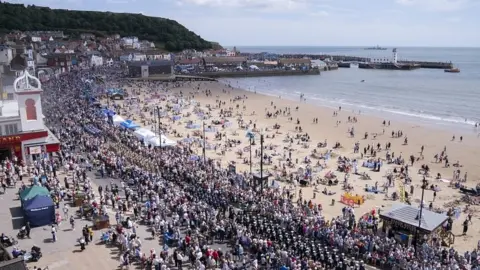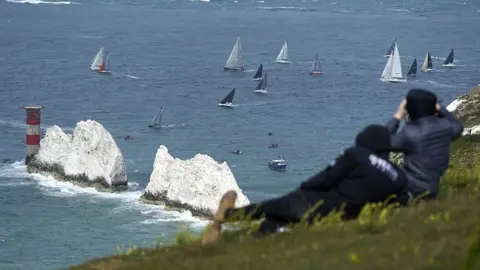Number of holiday-let homes in England up 40% in three years
 PA Media
PA MediaThe number of holiday lets in England has risen by 40% in three years, BBC analysis of council figures suggests.
Tourist areas which already had large numbers of such properties - including Scarborough, the Isle of Wight, North Devon, the Cotswolds and Norfolk - have seen sharp increases.
Ministers are looking at whether holiday lets should be registered.
This comes amid concern that inflated property prices are pushing established residents out of many areas.
Estate agents have reported a surge in second home ownership during the pandemic, with many buyers now offering these as holiday lets.
The BBC has obtained data from 152 individual councils across England on short-term lets - available for at least 140 days of the year and registered for business rates rather than council tax.
Among the councils who responded to the BBC, there was a 40% increase in such accommodation - from 19,543 in 2018 to 27,424 last year.
This tallies with government figures for the same period - covering the whole country but not broken down to a council-by-council level - which also show a 40% rise.
 PA Media
PA MediaAmong the BBC's findings, the seaside resort of Scarborough, which includes Whitby, had the highest number of holiday lets, rising from 2,032 in 2018 to 2,913 in 2021.
In second place was North Devon, where the figure went from 1,319 in 2018 to 1,758 in 2021.
East Suffolk was third, going from 1,475 to 1,614 over the same period.
Other areas where there was a sizeable number of holiday lets and a substantial increase between 2018 and 2021 included:
- The Isle of Wight - up 39%, from 908 to 1,262
- South Norfolk - up 97%, from 117 to 230.
- The Cotswolds - up 25%, from 802 to 1,002
- York - up 49%, from 448 to 669
- Great Yarmouth - up 44%, from 871 to 1,251
- East Riding of Yorkshire - up 51%, from 549 to 831

What's the impact on local people?
Charlotte Bater grew up in the village of Georgeham in North Devon, close to the popular surfing beach at Croyde.
She had to leave a rental property 10 months ago after being served with a no-fault eviction notice and she and her children moved back in with her parents.
"It does put a whole stop on your life. You can't plan anything. Everything comes back to: well, we don't know where we're going to be living. My children don't know where they're going to go to college. My youngest son, do you put him into nursery, do you not? I can't start back at work."
She says there are simply no properties available. "If they do come up, they are extortionately expensive. There'll be two, three hundred going for the same properties - that's for private rentals."
In the village, banners outside the school show it has spaces - Charlotte says it used to be oversubscribed but now struggles with numbers "which kind of gives you an indication as well into how the community's being affected, not just me".
Her friend Emma Hookway set up a campaign group for North Devon and neighbouring Torridge.
"There's a real fear in the area at the moment if you're renting. One of my friends the other day. she got a phone call from her estate agent and she felt like crying instantly. She thought, 'Oh, that's it, it's going to be sold. It's going to be converted into a second home or a holiday let.'"
Emma cleans holiday lets and says she understands the importance of the tourism industry to the area.
"We understand that people want to move to the area, that people are wanting to have holidays, especially being locked up after Covid. But there's got to be a balance and I think it's more important for people to be able to have their first home."

The government admits it only has a limited picture of how many properties across England are second homes and holiday-lets, particularly given the growth of online marketplaces such as Airbnb and Vrbo.
The Department for Digital, Culture, Media and Sport is looking at whether holiday lets should be registered, or even licensed.
It has now launched a call for evidence, promised in its Tourism Recovery Strategy in June 2021, on the impact of short-term lets on England.
Tourism Minister Nigel Huddleston said the government was "very aware" of the issues.
"There are many benefits to having more accommodation provision in the UK. It's good for our tourism industry that there's a variety of accommodation offers, but it can come with a downside as well so we want to get the right balance," he said.
"One of the options is to license accommodation at one extreme, or we could end up doing nothing."
MPs from several different parties have been raising concerns.
Lib Dem MP Tim Farron has previously called for more help for local people, and said the desire to buy second homes during the pandemic and the ease with which people can now advertise holiday lets online had pushed up prices.
"A bad situation has become entirely disastrous," he said in a debate earlier this year, adding that the cost of an average home in his constituency, which includes parts of the Lake District and Yorkshire Dales, was now around 11 times the average wage.
Some holiday-let owners say they switched to paying business rates during the pandemic to be able to access Covid grants, which may also have contributed to the increase in numbers.
Simon Matthews, who runs a holiday let in Ventnor on the Isle of Wight, said: "These businesses were as badly impacted by Covid as any other hospitality business, the grants were a lifeline to keep them viable."
